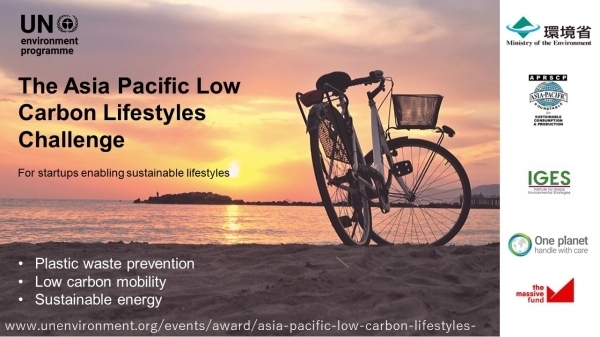
UNEP, partners launch pilot project to build flood-resilient homes in Bangladesh
The United Nations Environment Program (UNEP) and several partners launched a pilot project to build ...

The nine winners of the 2020 Asia-Pacific Low Carbon Lifestyles Challenge are advancing business solutions in order to depend on renewable energy, reduce of CO2 emissions and ditch plastic waste.
China’s Sissi Chao is one of the winners for her start-up REMAKEHUB which aimed getting rid of plastic waste. Sissi’s project works with non-governmental organizations (NGOs) and fishing companies and fashion brands to collect discarded fishing nets and then transform them into high-performance renewable plastic products.
Having already collaborated with the World Wildlife Fund (WWF) to create upcycled sunglasses and prototyping furniture, REMAKEHUB is fixing its gaze on the $141 billion eyewear market and the $100 billion furniture market.
Also, Rikesh Gurung from Bhuta – who was among the winners – worked on cutting plastic waste through transforming plastic waste into roadbuilding material.Rikesh founded The Green Road – which was the first of its kind in Bhutan – to serve this end.
As the first effort of its kind in Bhutan, they have already recovered 400 tons of waste plastic from landfills and industry and have used it to pave over 65 kilometers of road. With 20 percent of Bhutan’s 8,800km road network requiring surfacing each year, the potential demand for plastic waste is substantial.
Pursuing the same goal was Vietnam’s Linh Le who is also one of the winners. Linh’s reusable cup share system, AYA Cup, is taking aim at the 27 tons of plastic and Styrofoam generated by Vietnam’s food delivery and take-away industry every year. But her environmental efforts also aim to turn a profit – the single-use plastic industry in Vietnam is worth up to $1.6 billion each year.
China’s Kaikai Yang is seeking through Wattime Platform to connect renewable energy producers and consumers in rural areas. Often local generation and consumption is unbalanced, but Wattime aims to create a more sustainable business for renewables on the back of blockchain and advanced metering infrastructure technologies.
Also, Pakistan’s Osama bin Shakeel, who was an electrical engineer by training worked through his startup ENENT to build a solid-state load balancer that can save households 20-25 percent on their electricity bills with virtually no impact to the consumer.
The result is not only a welcome financial saving for household owners in Pakistan – it’s beneficial for the environment, cutting the carbon footprint of one of the largest contributors to climate change – buildings.
Vietnam’s Tuan Tran has not only worked on reducing energy consumption, but also cutting greenhouse gas emissions through his start-up Airiot.
The project is targeting the hotel and homestay market in Vietnam, where guests tend to leave air conditioning on even when they’re not in the room.
Airiot’s simple solution, already piloted in 500 rooms across Vietnam has shown a 25-40 percent reduction in electricity usage each month – with associated carbon emissions reductions.
Pichayanun Benjaboonyapisut – who is also one of the winners from Thailand – established his company CyFai to tap into two things Thailand has in abundance; sun and scooters.
CyFai started as a provider of shading solutions for parking lots. Now, they are working with technical partners to add solar panels and charging stations to the shading setup and finance e-bikes to low income customers.
The ebikes can also be used as mobile batteries for household energy use. CyFai is tying it all together to create an environmentally friendly alternative for the 83 percent of Thai households that use a scooter.
Going on the same track, India’s Ajay Singh worked through his Nimray Network to bring electric mobility full circle, connecting electric vehicles to clean energy production. As more and more electric vehicles are adopted around the world, Ajay is working to achieve the up to 95 percent reduction in carbon emissions that occurs when the vehicles are charged by renewable energy.
Also, Thailand’s Earth Choohut founded ETRAN on the idea to develop an electric motorbike for public transportation. Now with two models, the PROM and the KRAF, ETRAN is working to edge out the 18 million tons of carbon dioxide produced annually by electrifying Thailand’s 22 million motorcycles.
Greenhouse gas reduction isn’t Earth’s only goal – ETRAN’s two-wheelers are now over 40 percent bioplastics as well.
The United Nations Environment Program will support the winners through making the eight-week startup bootcamp online, and free to all interested entrepreneurs.
Each of the nine winners receives $10,000 in funding, in addition to training, business mentoring and technical analysis of their environmental impacts.
The United Nations Environment Program (UNEP) and several partners launched a pilot project to build ...
The European Investment Bank (EIB) is lending €200 million to Sweden-based Electrolux Group, a leading ...
The Global Environment Facility (GEF) has just approved $204.3 million for the United Nations Development ...


اترك تعليقا